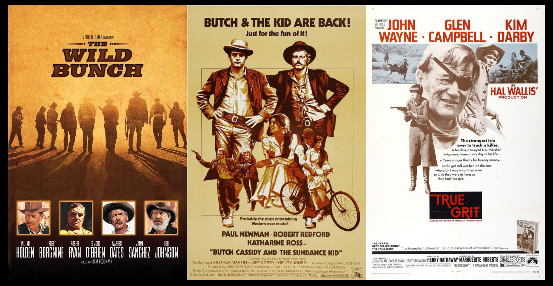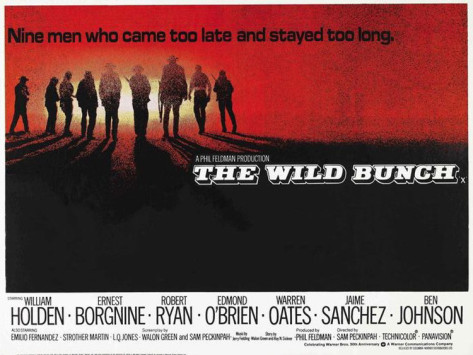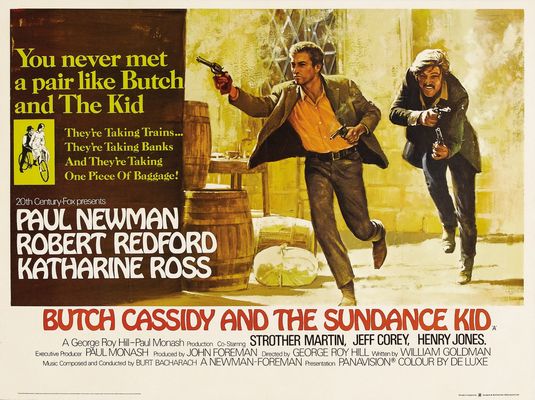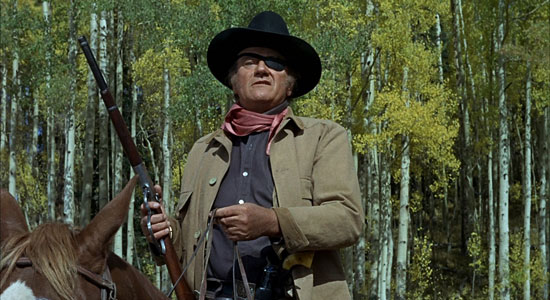

We begin our journey with the most revolutionary of the Western films of 1969, "The Wild Bunch". This Sam Peckinpah splatterfest begins with a robbery gone wrong. An entire small town gets shot to hell as a group of bandits make their escape from a hired posse that had set them up. Dozens are killed in the slow motion mayhem and the hired lawmen turn out to be worse scum than the bad guys. The old ways are dying and old loyalties die hard as well.

This is a mediation on masculine values. What really makes a man a good friend, when is the right time to fight, what sacrifices are you willing to make, and how reckless can you be and still thrive? The story focuses an a group of hardened men who are aging and still living life as outcasts and criminals. They have each others back for the most part, but sometimes they are capable of betrayal as well. "The Wild Bunch" is filled with macho posturing and is frequently broken up by scenes of hearty male laughter, signifying a grim but understood humor.
William Holden stars as the leader of the bunch, Pike Bishop. The rest of his gang consists of some of the great character actors of the 60s and 70s. Ben Johnson and Earnest Borgnine go back to the 50s. Warren Oates is a treasure that we should have had for a lot longer. Edmund O'Brien drops in as a mentor/passive partner of the gang. The band of mercenaries hired to get them is led by Pike's old friend and partner "Deke Thorton" played by longtime movie vet Robert Ryan. He can barely tolerate the low lifes that he has been given for the task and would much rather be riding with his old cohorts. The two most recognizable vermin on his crew are "Coffer" and "T.C." played by gritty western stalwarts Strother Martin and L.Q. Jones.

Holden and Borgnine form the nucleus of the film and their mediations on the changing ways of the world hold the key to the point being made here.
Pike Bishop: What would you do in his place? He gave his word.
Dutch Engstrom: He gave his word to a railroad.
Pike Bishop: It's his word.
Dutch Engstrom: That ain't what counts! It's who you give it *to*!
The final walk to the confrontation to rescue their captured friend is a moment of macho swagger that was added at the last minute but has survived for an eternity since then. If you think the line walking, laid back attitude of the hoods in "Reservoir Dogs" is cool, take a look at this image and remember that what follows was the most bloody and controversial moment of violence ever shown in a mainstream film up to that time.

Part two of our post today is almost a mirror image of the story from "The Wild Bunch". We still have two main outlaws who trade philosophical dialogue, they are part of a dying breed and time, and they are pursued by a relentless posse. In the reverse image however, the stars are not hardened aging men but handsome young guys. The posse is not made up of ragged scum but rather well trained professionals who are dedicated and law abiding. Instead of masculine posing we get a light hearted bromance with a dash of clever adventure thrown in.

"Butch Cassidy and the Sundance Kid" is an Academy Award winning script by the talented and prolific William Goldman. It has the advantage of mostly being true. The lives of the real outlaws were very much as depicted in the film. The romantic interest played by Katherine Ross was a real but unidentified woman and the "Whole in the Wall Gang" (in real life referred to as The Wild Bunch) did exist and carried out robberies of trains and banks across the west. The end of the story in real life took place in Bolivia, just as it was located in the film.

Unlike "The Wild Bunch", most of "Butch Cassidy" is charming rather than grim. Butch appears to be able to talk himself out of having to resort to violence most of the time. His cleverness becomes a running gag because his plans often are fouled up despite how intelligent they seem to be. He literally cannot believe that the posse can keep following them after a half dozen tricks he uses to throw them off the track. The famous scene of Newman and Redford jumping off the cliff is a result of necessity when his ingenuity leaves Butch and Sundance with no alternative.
There is a lot of humor in the film. As the characters migrate to South America, they struggle with the language differences and resort to using crib notes when holding up a bank. In order to throw off pursuers, they take legitamate jobs as payroll guards but are mocked by their employer for being so alert and trigger happy before there is any payroll for them to guard. Strother Martin appears once again, as the mining engineer Percy Garris, who hires the two to watch his back in retrieving the payroll for the mining operation. His character is also based on a real life acquaintance of the two outlaws.

There are a lot of modern film goers who don't seem interested in westerns. This is the western made for them. The plot is not based on a traditional showdown between the good guys and the bad guys, there are no Indian sub-plots, and the movie is funny as all get out. It is difficult to imagine a more mainstream film that will satisfy non-traditionalists as much as this movie does.
Most of you have probably seen the Coen Brothers version of "True Grit". While the Coens dismiss the idea that their version is a re-make, it has the same plot line and character arc from the book it is based on as this one does. The difference is that their film is a lot less sentimental and Rooster Cogburn is not nearly as charming, although he still has grit. I love both versions of the film but being an old guy, John Wayne is going to be my favorite.

There are several wonderful scenes that have much of the same arcane dialect found in the Coen film. There are also some amazing character actors in the film that should be noticed. Robert Duvall was not a star at this point, and he plays Ned Pepper as an ornery crook without much charm. His defiance of the Marshall at the end leads to that great showdown on horseback that everyone probably knows:
Ned Pepper: What's your intention? Do you think one on four is a dogfall?
Rooster Cogburn: I mean to kill you in one minute, Ned. Or see you hanged in Fort Smith at Judge Parker's convenience. Which'll it be?
Ned Pepper: I call that bold talk for a one-eyed fat man.
Rooster Cogburn: Fill your hands, you son of a bitch!
 Jeff
Corey was a familiar face playing Tom Chaney, the man that Mattie Ross
is pursuing. He was a well known acting teacher in the Hollywood film
community. Also present in a small role was the unlikely Dennis Hopper.
He spent more than a decade playing small parts on film and television,
he even worked with Wayne once before on the "Sons of Katie Elder".
This film came out the same year he broke out with his directing and
starring triumph "Easy Rider". Talk
about a pair of opposing films. "True Grit" is a western from an old
studio and a producer who was legendary since the thirties. "Easy Rider"
was a rejection of almost all that was standard in film making and it's
loose narrative, freeform shooting style and heroic drug dealers were
the antithesis of just about every convention that this John Wayne
picture represents.
Jeff
Corey was a familiar face playing Tom Chaney, the man that Mattie Ross
is pursuing. He was a well known acting teacher in the Hollywood film
community. Also present in a small role was the unlikely Dennis Hopper.
He spent more than a decade playing small parts on film and television,
he even worked with Wayne once before on the "Sons of Katie Elder".
This film came out the same year he broke out with his directing and
starring triumph "Easy Rider". Talk
about a pair of opposing films. "True Grit" is a western from an old
studio and a producer who was legendary since the thirties. "Easy Rider"
was a rejection of almost all that was standard in film making and it's
loose narrative, freeform shooting style and heroic drug dealers were
the antithesis of just about every convention that this John Wayne
picture represents.It is also fitting to note that once again, Strother Martin appears in a 1969 western. This time he is Col. Stonehill, the horse trading merchant that Mattie Ross trades barbs with as she prepares to follow the two lawmen in pursuit of Tom Chaney.
Mattie Ross: Do you know a Marshal Rooster Cogburn?
Col. G. Stonehill: Most people around here have heard of Rooster Cogburn and some people live to regret it. I would not be surprised to learn that he's a relative of yours.

Late in the picture John Fiedler shows up as Lawyer Dagget, a name Mattie has bandied about like a Colt six shooter and he is nothing that anyone would have expected. Looking at IMDB, it seems Wilfred Brimley has an uncredited role in the film as well. One of the great joys in westerns are the supporting performances that help make a story more interesting and realistic. It is not always the Sheriff facing down the bad guy in the last reel that makes the film work. All three of these films have unconventional stories, great supporting performers and completely different voices in describing the western experience. Whether you prefer the gritty violence of "The Wild Bunch", the romantic nostalgia of "Butch Cassidy and the Sundance Kid", or the sentimental traditional western take of "True Grit", it was clear that 1969 was stocked full of western movies that everyone should see.
Richard Kirkham is a lifelong movie enthusiast from Southern California. While embracing all genres of film making, he is especially moved to write about and share his memories of movies from his formative years, the glorious 1970s. His personal blog, featuring current film reviews as well as his Summers of the 1970s movie project, can be found at Kirkham A Movie A Day.

























